-
Mayo Clinic Q and A: Reducing the risk of medication errors

DEAR MAYO CLINIC: My friend's father recently died from a medication error. One of his prescriptions was filled incorrectly and caused a fatal reaction. I take multiple medications for various conditions. How can I reduce my risk for a medication error?
ANSWER: Medication errors refer to mistakes in prescribing and dispensing medications. These errors injure hundreds of thousands of people every year in the U.S. Common causes of medication errors include drug names that sound alike, medications that look alike, and medical abbreviations. Most medication errors can be prevented.
Knowledge is your best defense against medication errors.
One of the best ways to reduce your risk of a medication error is to take an active role in your health care. Learn about the medications you take, including possible side effects. Never hesitate to ask questions or share concerns with your health care provider or pharmacist.
Medication errors can happen to anyone in any place, including your home and at your health care provider's office, as well as a hospital, pharmacy or senior living facility. Children are especially at high risk for medication errors because they typically need different drug doses than adults.
An example of a medication error is taking an over-the-counter product that contains acetaminophen, such as Tylenol, when you're already taking a prescription pain medicine that contains acetaminophen. This mistake could cause you to take more than the recommended dose of acetaminophen, putting yourself at risk of liver damage.
Another example of a possible medication error is taking a depression medication called fluoxetine (Prozac or Sarafem) with a migraine drug called sumatriptan (Imitrex). Both medicines affect levels of a brain chemical called serotonin. Taking them together can lead to a potentially life-threatening condition called serotonin syndrome. Symptoms of the dangerous drug interaction include confusion, agitation, rapid heartbeat and increased body temperature, among others.
It is important to store medications in their original labeled containers and thoroughly read the instructions on how to take medications. Other medication errors include confusing eardrops and eyedrops, chewing nonchewable medications, cutting up pills, and taking the wrong dose.
Don't assume chewing a pill is as good as swallowing it. Some medications should never be chewed, cut or crushed. Doing so can change how the body absorbs them. Ensuring an accurate dose of liquid medication is critical, so avoid using spoons in your silverware drawer versus a syringe or dose cup, both of which are available at most pharmacies.
Be proactive and review your medications regularly, especially when you start a new medication.
Ask your physician or pharmacist these questions:
- What is the brand or generic name of the medication?
- What is the medication supposed to do? How long will it be until I see results?
- What is the dose? How long should I take it?
- What should I do if I miss a dose?
- What should I do if I accidentally take more than the recommended dose?
- Are there any foods, drinks, other medications or activities I should avoid while taking this medicine?
- What are the possible side effects? What should I do if they occur?
- Will this new medication interfere with my other medications? If so, how?
Your health care provider can help prevent medication errors by using a computer to enter and print, or digitally send, prescriptions, instead of handwriting prescriptions. When you pick up a prescription, check that it's the one your health care provider ordered. It also helps to save the information sheets that come with your medications.
Another way to reduce the risk of a medication error is to reconcile your medications during each visit with your health care provider. This involves comparing the list of medications your health care provider has with the list of medications you are taking, which can help avoid medication mistakes.
It is important to share this information:
- The name and strength of all medications you're taking and when you take them, including prescriptions; herbs; vitamins; nutritional supplements; over-the-counter drugs; vaccines; and anything received intravenously, including diagnostic and contrast agents, radioactive medications, feeding tube supplements, and blood products.
- Any medications that you're allergic to or that have caused problems in the past.
- Whether you have any new chronic or serious health problems.
- If you might be pregnant or you're trying to become pregnant.
Also, keep a current list of all your medications, including nonprescription drugs and supplements, in your wallet, purse or other safe location. Being prepared and informed are the best ways to avoid health concerns. — Compiled by Mayo Clinic staff
Related Articles







